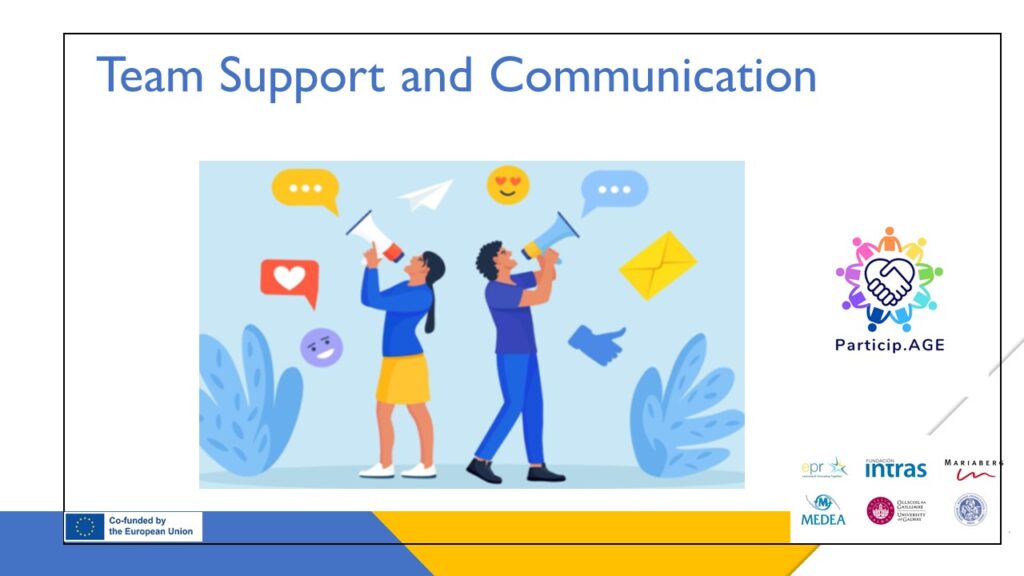
Why is team communication important in the workplace?
- Team communication is one of the most fundamental aspects of collaboration.
- Communication in teams is more than just efficient work. It allows everyone on the team to be educated on any topic that may affect their work.
- Team communication develops trust, builds camaraderie among the team members, boosts morale, and helps employees stay engaged in the workplace.
- Team communication provides several other benefits, including the potential to encourage creativity, enhance employee engagement, and increase productivity.
The benefits make it clear how essential communication is to the workplace.
1.Builds healthy relationships
2.Improves employee engagement
3.Impacts employee wellbeing
4.Brings more innovation
5.Enhances transparency
6.Develops employee skills
7.Reduces conflicts
Builds healthy relationships
- People have psychological needs; they want to be understood, validated, and accepted.
- Healthy work relationships can increase self-esteem and job satisfaction, improve employee retention, and create a more stable work environment.


- A clear, concise, and consistent set of communication practices is very important.
- Effective team communication reduces doubts and helps employee generate ideas with their peers and managers.
- Team communication encourages a culture of recognition in the workplace, which is a great way to motivate employees.
- In a culture of strong team communication, team members acknowledge each other’s accomplishments, feel great belonging, and are more engaged and satisfied.
Impacts employee wellbeing
- People have psychological needs; they want to be understood, validated, and accepted.
- When team members keep open communication and share their experiences related to any issues, it keeps them emotionally healthy.
- Team members’ productivity can drop when they are not in regular contact with colleagues and team leaders.
- When team members feel undervalued because they aren’t receiving the interactions they need, their wellbeing may drop.
Brings more innovation
- A workplace has diverse people from different backgrounds. Their life experiences and perspectives allow them to look at an existing problem with new ideas.
- We can only benefit from this if open communication is supported.
- Creating a culture of openness and encouraging team members to share their ideas and views leads to better decisions and bring innovation.


Enhances transparency
- To ensure a smooth work process and the best results, all team members must keep each other informed and maintain transparency.
- Transparency allows everyone to communicate effectively, provide constructive feedback, solve problems, and build relationships.
- It helps build stronger teams while also increasing their collective work efficiency. When team communication is not effective, transparency declines.
Develop employee skills
- Team members who work together develop better skills.
- Collaboration allows team members to gain knowledge and insights from their colleagues.
- Effective communication among team members gives a clearer evaluation of their skills and performance.
- Open feedback channels help teams set standards for themselves and learn more about their strengths and weaknesses. It gives employees the objectivity to improve, learn and grow.

Reduce conflicts
- Conflicts in the workplace are inevitable.
- Many people do not know how to avoid them by communicating effectively.
- Effective communication leads to productive discussions and allows for better planning.
- It helps employees to look into a conflict objectively without getting personal. And it strengthens the likelihood of healthy cooperation among team members.
How can you improve team communication?
- Active listening
- Techniques include:
- Being fully present in the conversation
- Showing interest by practicing good eye contact
- Noticing (and using) non-verbal cues
- Asking open-ended questions to encourage further responses
- Paraphrasing and reflecting back what has been said
- Listening to understand rather than to respond
- Withholding judgment and advice
Communicate clearly and concisely
- Employees have their inboxes full, and their days are busy.
- When leaders communicate clearly, team members have a better understanding of their roles and tasks.
- When you communicate concisely, your message is more likely to be received and understood.

Be open to feedback
- Teams who understand the importance of team communication in the workplace often promote a culture of open feedback
- Open feedback means recognizing a job well done as well as giving suggestions on improving in certain areas.
- Teams should also frequently ask each other for suggestions, comments, and ideas to open up opportunities for improvement.
Organize one to ones and group meetings
- Every leader should have regular one to ones with every team member and also facilitate regular group meetings.
- This ensures that every employee gets the dedicated time to talk about themselves and their individual work.
- On the other hand, group meetings promote stronger team bond and alignment on crucial projects.

Assignment
- Thinking about any teams you work in, or have worked in, how could these steps be applied to improve communication?
- What are the benefits you could expect to see, with improved communication?
